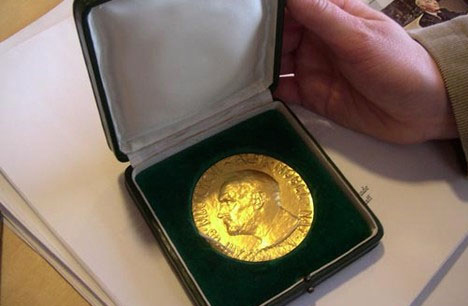Three women from Liberia and Yemen received the Nobel Peace Prize on Saturday in recognition of their efforts to enhance the role their gender in peace work, and used their acceptance speeches to call for peace, justice and gender equality, dpa reported.
Liberian President Ellen Johnson-Sirleaf shared the prize with her compatriot Leymah Gbowee and pro-democracy activist Tawakkul Karman of Yemen.
Karman, the first Arab woman to win the peace prize and the youngest winner ever at age 32, said she accepted the award "on behalf of the Yemeni and Arab revolutionary youth, who are leading today's peaceful struggle against tyranny and corruption."
The three laureates had shown "the will to act" and signalled a positive trend that "women are not only victims," said Thorbjorn Jagland, head of the Norwegian Nobel Committee.
He mentioned efforts by Johnson-Sirleaf and Gbowee to end the 14-year-long civil war in Liberia, and how Karman had campaigned against Yemen's President Ali Abdullah Saleh and for justice and democracy.
"The promising Arab Spring will become a new winter if women are again left out," Jagland cautioned.
The three each received a diploma and gold medal, and were to share the cash prize of 10 million Swedish kronor (1.4 million dollars).
The presence of the three laureates was a strong contrast with last year's ceremony when an empty chair served as a stark reminder of the absence of jailed Chinese political activist Liu Xiaobo.
In a separate ceremony at the Stockholm Concert Hall, Swedish King Carl XVI Gustaf presented the Nobel Prizes for physics, chemistry, medicine, literature and economics.
Half the 10-million-kronor (1.4-million-dollars) physics prize was awarded to Saul Perlmutter of the United States; while Brian Schmidt, who holds Australian and US citizenship, and Adam Riess of the US shared the other half "for the discovery of the accelerating expansion of the universe" through supernova observations.
Israeli Dan Shechtman won the chemistry prize "for the discovery of quasicrystals" changing the foundations of solid state sciences.
One half of the medicine prize was awarded to Bruce A Beutler of the US, Jules A Hoffmann of France; while the other half went to the late Canadian-born Rpalph M Steinman for discoveries relating to the immune system.
Steinman died in October at age 68, just three days before the award announcement, but his widow, Claudia, accepted the award on his behalf.
Swedish poet Tomas Transtromer received the literature prize amid huge applause from the audience. The 80-year-old poet - whose work has been translated into more than 50 languages - suffered a stroke in 1990 that severely impaired his speech. He sat in a wheelchair during the ceremony since the stroke also left him partly paralysed.
The Stockholm ceremony concluded with American duo Thomas J Sargent and Christopher A Sims accepting the economics prize for work on "cause and effect in the macroeconomy."
The economics prize, created in 1968, was not one of the original prizes endowed by Swedish industrialist Alfred Nobel, the inventor of dynamite. In accordance with his will, the peace prize is handed out in Oslo.
Each prize is worth 10 million Swedish kronor.
The Stockholm Concert Hall was decorated with thousands of flowers from San Remo, Italy, where Nobel died on December 10, 1896.
Some 1,300 guests, including royal family members, diplomats, academics, politicians and leaders from the worlds of business and the arts then attended a banquet at Stockholm's City Hall.
Nobel laureates accept awards - and accolades
Three women from Liberia and Yemen received the Nobel Peace Prize on Saturday in recognition of their efforts to enhance the role their gender in peace work, and used their acceptance speeches to call for peace, justice and gender equality, dpa reported.






